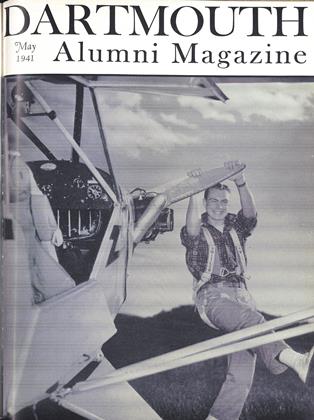This the eighth of eight articles describing the eight semesters which the class of 1916 spent at Hanover. Insofar as they have left any impression in the mind of the writer, they have discouraged him by revealing how very busy we were then and in how many different ways. And yet, such a comparatively inconsiderable fraction of our doings has been mentioned here that a passing reference to some few of the omissions seems only fair. We who came from a given locality were usually members of one of the sectional clubs; then there were the Polity Club, Chess Club, Camera Club, Cercle francais, Deutsche Verein, Classical Club, etc. We all attended a never ending procession of Hums, Smokers, Mass Meetings, Get Wise Meetings, Concerts, Lectures, Art Shows. Nothing .seemed more significant to us then than the fraternity or Phi Beta Kappa; the courses in religion offered by the church often drew large numbers; the trips of the Outing Club were always popular; some even spent considerable time in connection with studies, and some earned their daily bread. I submit again (and for the last time) that our combined activity was tremendous and that substantial evidence will be required at our reunion in June before one would be justified in believing that we can eVer be the same again.
The basketball team reported with Capt. G. V. Rector, C. J. Eskeline, J. A. Pelletier, and E. R. Williams among the veteran stars. They won five of the first six games, but finished only fifth in the league. However, this was our best showing since 1912 in basketball and we had to our credit eleven wins out of twenty three starts. The hockey team did not achieve marked distinction that year, but the relay team helped out the indoor track season by defeating all opponents. The tennis players lost to Yale, Harvard, and Penn., but won from Williams, Springfield, Brown, and Amherst, which appears to have given us the championship of New England somehow. Baseball was peculiar too that spring: the team defeated N. Y. U., Fordham, New Hampshire, Mass. Aggies, Brown, Georgetown, Vermont, Yale, Wesleyan, Williams, Princeton, and then lost to Tufts (twice), Holy Cross, Amherst, and Brown.
The nominating committee of 1916 (J. H. Mensel, L. P. Gove, P. G. Nordell, R. Parkhurst, R. S. Steinert) conducted the elections which resulted in the following impressive roster: President, E. C. Riley; Vice-President, P. O. Soutar; Secretary, R. Parkhurst; Treasurer, J. Gile; Marshall, C. A. Pudrith; Director of Senior Ball, E. A. Shaw; Executive Committee, J. A. Pelletier, J. H. Mensel, G. B. Fuller, H. C. Bean, D. W. Fuller, H. W. Marble, C. C. Hitchcock; Auditing Committee, C. M. Belknap, E. R. Williams, E. L. Mack. The following addresses were determined upon; To the President, L. R. Jordan; To the Chapel, J. M. Larimer; To the Old Pine, W. E. Biel; Class Orator, M. Spelke; Class Poet, S. W. Harvey; Class Odist, F. S. Wilson; Sachem Orator, R. F. DeVoe; Class Chorister, L. W. Joy.
The annual "senior choices" may be summarized as follows: favorite college after Dartmouth, Princeton, Yale, Harvard; women's college, Smith, Wellesley, Vassar; author, Kipling, Conrad, Shakespeare; newspaper, New York Times, Boston Journal, Boston Transcript; professor, Emery, Phillips, Wicker; poet, Kipling, Noyes, Browning; song, Dartmouth Song, Perfect Day; sport, football, tennis, baseball; study, Economics, English; favorite all-round man, Pudrith, Riley; popular, Pudrith, Soutar, Riley; respected, Pudrith, Parkhurst, Riley; intellectual, Chase, Cranston, Evans; athlete, Pudrith, Riley, Williams; busiest, English, Evans, Joy; likely to succeed, Emery, Evans, Magill; brightest, Bean, Magill, Cranston; cleverest, Joy, Mackie, Burlen; wittiest, Coakley, Mackie, Nagle; handsomest, Tuttle, Lapierre, Nagle; laziest, Knight; greatest talker, Spelke; best dressed, Costello, Davidson, Shaw.
The war in Europe was still of small moment to us. The Dartmouth Batallion drilled quietly in the gym and recruited new members throughout the semester, but military training was opposed at every step by communications in the Dartmouth and finally by an active group called the "Independence League." However, the faculty voted that three hours of academic credit should be granted to those who completed the course at Plattsburg and at Commencement there were forty eight Dartmouth undergraduates who had signed up. This chapter of our college history might conceivably be illuminating to us today, if space permitted us to examine it. There are so many elements in the situation which have since become so very stereotyped, as e.g. when John Sparge addressed the college upon the theme Socialism and War or when Raymond Robbins, backed by a committee of one hundred prominent undergraduates, told us all about the Challenge of the Changing Social Order.
There seems little use now in recalling how the 230 of us felt at Commencement, because we remember how we all felt then about each other and about the College, and because we know that we all feel about the same today—only more so. Yes, Commencement came off all right: C. A. Pudrith was awarded the Barrett cup, the speakers all did well, the bad weather disturbed no one, and the Trustees announced that Ernest Martin Hopkins '01 had been chosen President of Dartmouth.
 View Full Issue
View Full Issue
More From This Issue
-
 Article
ArticleIdeals of Work-Service in Vermont
May 1941 By CRAIG KUHN '42 -
 Class Notes
Class Notes1921
May 1941 By CHARLES A. STICKNEY JR., ORTON H. HICKS -
 Article
ArticleWhat of the Senior Fellows?
May 1941 By THEODORE WACHS JR. '41 -
 Article
ArticleThe Undergraduate Chair
May 1941 By CHARLES BOLTE '41 -
 Article
ArticleCourse Elections Stressed
May 1941 -
 Article
ArticleOdyssey of Songsters
May 1941 By James H. Rendall Jr '42









